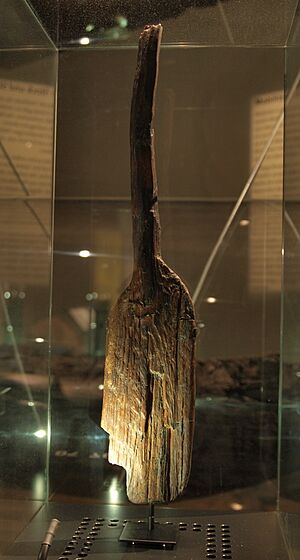Paddle facts for kids
A paddle is a special tool used to push against water. It helps boats move forward, or it can be used to stir liquids.

Contents
What is a Paddle?
A paddle is a simple but powerful tool. It works by pushing against water, which creates force to move something, like a boat. Think of it like pushing off the ground to walk; a paddle pushes off the water.
Paddles for Moving Boats
Paddles are mostly known for helping people move boats like canoes and kayaks. They are different from oars because paddles are held freely in your hands, not attached to the boat. You use your body to move the paddle through the water.
Canoe and Kayak Paddles
Paddles used in canoes usually have one blade (the flat part that goes in the water) and a handle at the other end. The long stick part is called the shaft. These paddles are often made from wood, fiberglass, or metal.
Paddles for kayaks are a bit different. They are longer and have a blade on both ends of the shaft. This lets kayakers push water on both sides of their boat without switching hands. Kayak paddles usually don't have a separate handle like canoe paddles do.
How Paddles are Made
Paddles are built to be strong and light. The shaft is the main rod you hold. It needs to be tough enough to handle the force of pushing water. The blade is the flat part that actually pushes the water. Blades are designed in different shapes to work best for various types of paddling, like racing or touring.
Materials like wood are traditional and offer a warm feel. Fiberglass is popular because it's strong and lightweight. Metal paddles are also very durable. Sometimes, paddles are made from carbon fiber, which is incredibly light and stiff, perfect for competitive sports.
Ancient Paddles
Paddles have been used for thousands of years! One of the oldest paddles ever found is called the Duvensee paddle. It was discovered in Germany and dates back to the Mesolithic period, around 6,200 B.C. That's over 8,000 years ago! This shows how important paddles have been for human travel and survival throughout history.
Images for kids
 | William M. Jackson |
 | Juan E. Gilbert |
 | Neil deGrasse Tyson |




